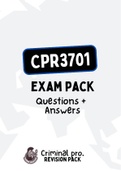Exam (elaborations)
CPR3701 - EXAM PACK (Questions and Answers for )
- Course
- Institution
- Book
Latest exam questions and ANSWERS • and NEW study notes (Summary notes covering all chapters) • Helps you see what questions are likely to be asked, and how to answer them.
[Show more]




